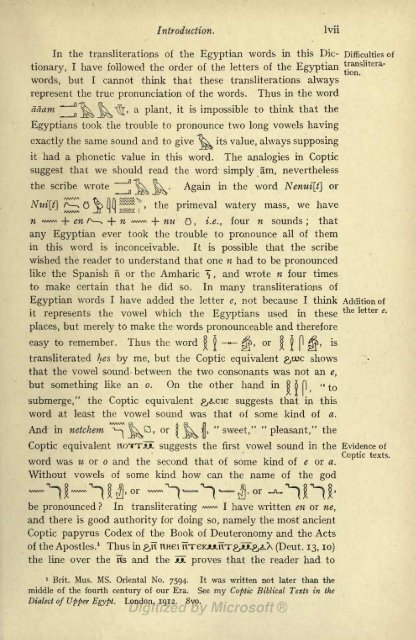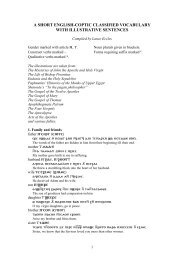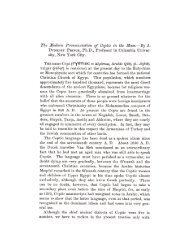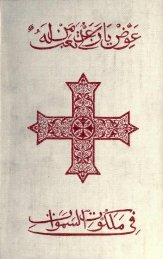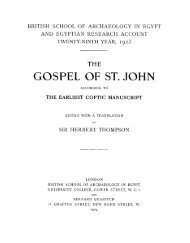- Page 2:
HANDBOUND AT THE UNIVERSITY OF TORO
- Page 8 and 9:
HARRISON AND SONS, PRINTERS IN ORDI
- Page 11:
CONTENTS. DEDICATION ....... ' INTR
- Page 14 and 15: Demotic vocabularies of Akerblad an
- Page 16 and 17: Young's Demotic Dictionary. Alphabe
- Page 18 and 19: Introduction. sometimes that which
- Page 20 and 21: Progress of Egyptology retarded by
- Page 22 and 23: xiv Introduction. Champollion's man
- Page 24 and 25: Theories of de Guignes the Sinologi
- Page 26 and 27: xviii B \ f P- '&uej' v me. Introdu
- Page 28 and 29: His ideophonetic arrangement. Arran
- Page 30 and 31: xxii Introduction. Lettre d M. Daci
- Page 32 and 33: xxiv Introduction. who had only stu
- Page 34 and 35: XXVI Introduction. o u h ^- H ^-~ T
- Page 36 and 37: 60 * xxvii Introduction. t t* \T~\\
- Page 38 and 39: Champollion- Figeac accepts the arr
- Page 40 and 41: He finally adopts a phonetic alphab
- Page 42 and 43: An English edition of Bunsen's " Ae
- Page 44 and 45: xxxvi Introduction. Contemporary me
- Page 46 and 47: xxxviii Introduction. of a large nu
- Page 48 and 49: His mission to Persia. Race for pri
- Page 50 and 51: Birch contemplates a second edition
- Page 52 and 53: Levi's Egyptian- Italian Dictionary
- Page 54 and 55: The Theban Recension of the Book of
- Page 56 and 57: xlviii Introduction. of the Dead in
- Page 58 and 59: A friend offers to defray the cost
- Page 60 and 61: Geographical names included. Geogra
- Page 62 and 63: liv Introduction. France, by Griffi
- Page 66 and 67: Iviii Introduction. supply some vow
- Page 68 and 69: 1Y A 1 c. 1 Consonants : Jb,v (l) I
- Page 70 and 71: Maspero on Egyptian phonetics. and
- Page 72 and 73: -^rarely 1 ' and fl Ixiv Introducti
- Page 74 and 75: Brugsch on the Semitic origin of th
- Page 76 and 77: Egyptian e ln"AfrTca language. Perp
- Page 78 and 79: The Introduction. Lists of Hierogly
- Page 80 and 81: Ixxii Introduction. Champollion, Le
- Page 82 and 83: Messrs. Harrisons' fount of Egyptia
- Page 85 and 86: A LIST Of the principal works used
- Page 87 and 88: Bubastis Buch Cairo Pap. Canopus St
- Page 89 and 90: Harris 500 Harris 501 Hearst Pap. .
- Page 91 and 92: Mar. Cat. Mar. Kar. Mar. M.D. Mar.
- Page 93 and 94: Peasant Piankhi Stele Piehl Pierret
- Page 95 and 96: Sallier IV San Stele Sarc. Seti I S
- Page 97 and 98: Tomb of Rameses IV, etc. Tomb of Se
- Page 99 and 100: Bissing, Boehl, F. M. T. Boinet, A.
- Page 101 and 102: Eg. Exp. Fund Erman, A. Gardner, A.
- Page 103 and 104: Naville, E. Naville, E. Pellegrini,
- Page 105 and 106: A LIST Of the most frequently used
- Page 107 and 108: Number. Hieroglyph. Phonetic Value.
- Page 109 and 110: A List of Hieroglyphic Characters.
- Page 111 and 112: A List of Hieroglyphic Number. Hier
- Page 113 and 114: A List of Hieroglyphic Characters.
- Page 115 and 116:
Number. A List of Hieroglyphic Char
- Page 117 and 118:
Number. Hieroglyph. Phonetic Value.
- Page 119 and 120:
Number. A List of Hieroglyphic Char
- Page 121 and 122:
Number. A List of Hieroglyphic Char
- Page 123 and 124:
Number. Hieroglyph. Phonetic Value.
- Page 125 and 126:
Number. A List of Hieroglyphic Char
- Page 127 and 128:
Number. Hieroglyph. Phonetic Value.
- Page 129 and 130:
Number. . 5 6,7 8 9 10 11,12 '3 14
- Page 131 and 132:
Number. A List of Hieroglyphic Char
- Page 133 and 134:
Number. A List of Hieroglyphic Char
- Page 135 and 136:
A List of Hieroglyphic XIV. BUILDIN
- Page 137 and 138:
Number. A List of Hieroglyphic Char
- Page 139 and 140:
A List of Hieroglyphic Characters.
- Page 141 and 142:
Number. Hieroglyph. Phonetic Value.
- Page 143 and 144:
Number. A List of Hieroglyphic Char
- Page 145 and 146:
dumber. A List of Hieroglyphic Char
- Page 147 and 148:
A List of Hieroglyphic Characters.
- Page 149 and 150:
Number. A List of Hieroglyphic Char
- Page 151 and 152:
A List of Hieroglyphic Characters.
- Page 153 and 154:
Number. A List of Hieroglyphic Char
- Page 155 and 156:
Number. A List of Hieroglyphic Char
- Page 157 and 158:
HEBREW LETTERS. cxlix THE HEBREW AL
- Page 159 and 160:
ARABIC NAMES OF THE LETTERS. cli TH
- Page 161 and 162:
I Gl'Z cliii THE AMHARIC SYLLABARY.
- Page 163 and 164:
a Wx i in some respects = Heb. N a
- Page 165 and 166:
O i of the Dream, ; * 1 * 'O t %s a
- Page 167 and 168:
ab Ibv
- Page 169 and 170:
ani *S\ (|(j A,Rev. 12, 19 =(| _CES
- Page 171 and 172:
akliakh I, bone; plur. akh . akb.a
- Page 173 and 174:
aqa place ; see A aqa r- aqau Aqan
- Page 175 and 176:
ati-t 1^ (j(j plur. (? ; see couch,
- Page 177 and 178:
, represents a short sound of a, e
- Page 179 and 180:
%2 A [17] A f\ Xfl A*WVNA Aa-t ent
- Page 181 and 182:
A [ 19 ] Aab[it] 'I J, Tuat I, a si
- Page 183 and 184:
A [21] Mission I, 596, Rec. 32, 177
- Page 185 and 186:
aakhu , U. 622, p. 237, (j . , A.Z.
- Page 187 and 188:
A Aakhut-en-aten c3 II, 13, a title
- Page 189 and 190:
* * aathamai V 1 ^e, Kiss? -^ 4
- Page 191 and 192:
aaan A aaani Amen. 17, 9, 22, ape $
- Page 193 and 194:
Au-ankhiu-f I I , TuatXIl, one of t
- Page 195 and 196:
auau (j %ts^%3^-> , flesh and bone,
- Page 197 and 198:
Aunut 31, 173, a. group of divine b
- Page 199 and 200:
A [37] A aut fl %~)j Rev - "' '43,
- Page 201 and 202:
aba aba, abaa A [39] p. 165, M. 317
- Page 203 and 204:
abt abtu A frd- net= (] J H J \\ '
- Page 205 and 206:
P. 40, 301, M. 610, 636, Hh. 312, t
- Page 207 and 208:
i, title of a priest of Heru-ur 4U
- Page 209 and 210:
Aini-Nu aged primeval Sky-god. Ami-
- Page 211 and 212:
Rev., to overeat ; Copt. OTftOAXOTH
- Page 213 and 214:
I Jj , B.D. 164, 4, a name of Sekhm
- Page 215 and 216:
; Amen-qa-ast (j the exalted throne
- Page 217 and 218:
i A [55] A , the Kingdom of Seker,
- Page 219 and 220:
Rec. 32, 82, the name of a serpent
- Page 221 and 222:
B.D. 15, 89, i, a form of Osiris, t
- Page 223 and 224:
Peasant ,6, fl ^ J M fl 1 /WWW O I
- Page 225 and 226:
Anratat 1 1 . 4 AAAAAA < I the rive
- Page 227 and 228:
A [ 65 ] ar J]. an old form of the
- Page 229 and 230:
ari-t setep sa(?) ' ^, to make magi
- Page 231 and 232:
Ar-ti-tchet-f(P) god of the gth day
- Page 233 and 234:
j , ariretui belonging to the feet,
- Page 235 and 236:
Treaty 10, with, along with; Copt.
- Page 237 and 238:
| I A [ 75] of the -www *K WWVA i i
- Page 239 and 240:
Ahkai who composed magical spells f
- Page 241 and 242:
, \J. 418, the two regions (?) ikhe
- Page 243 and 244:
i . ^ I i I 1 I I I disease caused
- Page 245 and 246:
asa () M. 14 = * guard, to pasture
- Page 247 and 248:
Asar-em-Benben-t J J, B.D. 142, 83,
- Page 249 and 250:
Asar-Neb-tchet 56, Osiris, Lord of
- Page 251 and 252:
thicket, undergrowth, scrub, thorn
- Page 253 and 254:
Asten nation of Thoth ; Abdera. ast
- Page 255 and 256:
aq a Ij > form, ceremony ; see A aq
- Page 257 and 258:
Akeb (j A ^z^> | i, so, ! O ffi .
- Page 259 and 260:
cords. at-t (I 0, a cord net ; plur
- Page 261 and 262:
; 1 A [99 ] aten-t (| ^ ^ , aten A
- Page 263 and 264:
, IV, 667, t\ foragers; 1 ^ ^*-i ff
- Page 265 and 266:
I []03] A c Atem ft |, god of the -
- Page 267 and 268:
a D=Heb. y. j| jj piece, one, a, an
- Page 269 and 270:
a , A [107 ] to grow (of the moon).
- Page 271 and 272:
Aa-t-Aat-t H I , Tuat IX, a singing
- Page 273 and 274:
J' aabag aabt aap Aapep D D Tflfift
- Page 275 and 276:
Sallier Pap. II, 4, 2, 5, 8, cord,
- Page 277 and 278:
auau brigand; plur f] Thes. 1480; f
- Page 279 and 280:
-Jp abU -fl fC~ , to > purify, to m
- Page 281 and 282:
aper Q~-j-ejf , a boat equipped wit
- Page 283 and 284:
Am-a V Am-a-f 1 "~ A [121] A Tuat V
- Page 285 and 286:
an D O - g\ An I_^_, =5^ , _/| Berg
- Page 287 and 288:
f: i-f l-f ankhu ' f AAAAAA -fv 236
- Page 289 and 290:
!\ (1 YTr 4T.TVT * a \\ i H J^. Q I
- Page 291 and 292:
Antch-mer a lake in Sekhet Aaru. **
- Page 293 and 294:
' Copt. arb arp-t arp-t , eXg, ^. A
- Page 295 and 296:
A [133] A aha Q^2l, unlucky, unfavo
- Page 297 and 298:
akh - 239, fl T7 w A , T. 8 S , N.
- Page 299 and 300:
Ash-kheru Berg. I, 1 8, a ramheaded
- Page 301 and 302:
aq aq-ui (?) aq aq aq I AA/WW ^S=c
- Page 303 and 304:
Amen. 17, 6, Ml, 18, 20, a plant. a
- Page 305 and 306:
or \\ [143] or \ ibsba-t OO'i^liti!
- Page 307 and 308:
uau^g, jQ Vi, v> AWM Rec - l8 l8l >
- Page 309 and 310:
uara ^)'^ ^^> } 1 1 1 uar- , reed,
- Page 311 and 312:
uas-t (?) Ufefj. Uasit |" consort o
- Page 313 and 314:
Uatch-ur P. 690, N. 67 kV*: u [151]
- Page 315 and 316:
^So u [153] u wwL-fl' to put aside,
- Page 317 and 318:
Copt. uaa uaab u Rev. n, 136, will,
- Page 319 and 320:
= u [157] U uar-t ^ B.D. , 150, 14,
- Page 321 and 322:
u [159 ] U A "" V
- Page 323 and 324:
u [161] U up-t \/, income, revenue,
- Page 325 and 326:
Upi- ...... ^^ Sj u [ 163 ] U ^ , "
- Page 327 and 328:
I .1 I AAAAAA u [165] U v\ ui | TT
- Page 329 and 330:
e shaved clean, to pluck out the ha
- Page 331 and 332:
TJnem-utch-bah-ab A j, A$ , u [169
- Page 333 and 334:
uraa cz ur-t aa-t ur khet (akh-t) u
- Page 335 and 336:
Ur-ares, Urarset ^ ~ god of a boat
- Page 337 and 338:
. to urmit urmu urh , u [ 175 ] U N
- Page 339 and 340:
uhem ense[m]-t neb u [177] U " tell
- Page 341 and 342:
Uha (remu) .Sherman; plur. T> , Rec
- Page 343 and 344:
$ u [181] u ^ use[kh]-t a ^ p M arm
- Page 345 and 346:
Usekh-t uraeus-goddess. % R JTI use
- Page 347 and 348:
ushush usha U
- Page 349 and 350:
ushet-ti ushetu ushet ^ IMil ushet-
- Page 351 and 352:
u Utet-f-em- pet *, Den- derah II,
- Page 353 and 354:
'Y\ C= uteb , ^\ fc u [191 ] U = Sh
- Page 355 and 356:
I utchi-t u [ 193 ] U A ,. Rec. 20,
- Page 357 and 358:
utcha rut (var. (j (1 o ) , Peasan
- Page 359 and 360:
J b J = Heb. 1. B b j | , abode, pl
- Page 361 and 362:
o\\! J B [199] B Baat-erpit D , Ba-
- Page 363 and 364:
J B [201 ] B J S fl, 3j (|(| ^j, Re
- Page 365 and 366:
aiti J [ 203 ] J Egypt; Gr. BT,,(?)
- Page 367 and 368:
J B [ 205 ] B J bahu (?) i^Tfl. Ber
- Page 369 and 370:
, olive oil. III bakbak B [ 207 ] B
- Page 371 and 372:
J M Jfl B palm (?) garland, plant (
- Page 373 and 374:
J B [211] bab-t UJ ' (SaVte) ' I33
- Page 375 and 376:
J B [ 213 ] a bana j ^J A^AAAA I N
- Page 377 and 378:
Israel Stele 9. J B [215] J I I I T
- Page 379 and 380:
J B [217] B J n n AAAAAA n benben ,
- Page 381 and 382:
J benrit B ,U. 1 63,^134, AW V a nJ
- Page 383 and 384:
ehen Behen-t J B [221] B J o AAAAAA
- Page 385 and 386:
J besbesiu XIII, 15, i; a seed or h
- Page 387 and 388:
J B [ 225 ] B J beqsu ^Jlj>, U. 310
- Page 389 and 390:
n o /o. n betnu J >V& , J B [ 227 ]
- Page 391 and 392:
p D ; Heb. rj . P, pi D, = A^ \v\ ,
- Page 393 and 394:
, IV, 1 1 68, the beginning of time
- Page 395 and 396:
Rec. 31, 172. ' ), P. 161, paq a^^^
- Page 397 and 398:
pui to fly ; ^ pui pui see puiu , f
- Page 399 and 400:
Penrent ^ D A.Z, 1906, 137, the AAA
- Page 401 and 402:
D V Per-en-bakh-t 3 r 35 per-en-per
- Page 403 and 404:
, , - . ,, Rec. 15, 150, L -* ^ , p
- Page 405 and 406:
per-t shesp .-"'n -m: a S , r "" 1
- Page 407 and 408:
D [245] D pehu ta C7 7 C7 , swamps
- Page 409 and 410:
pekharit 33> 5> 33> O O, Rec. | O ,
- Page 411 and 412:
pesesh-t D [ 249 J ii v- i i v- _n_
- Page 413 and 414:
D -t !ii(J [ RIM I ll pestch-t e, i
- Page 415 and 416:
_ , IV, 755, A.Z. 45, 133, a bowl,
- Page 417 and 418:
Pteh-res-aneb-f D jj J) 1 d A ) 1
- Page 419 and 420:
a [257] D petch-t ha-t O ^ = , N. 4
- Page 421 and 422:
fa-akhu *^> fire on the altars. U f
- Page 423 and 424:
plur. F [261] P tent worm, serpent;
- Page 425 and 426:
fethth fet M. 655, , N. 76,, X F [
- Page 427 and 428:
M mmeh Rev. n, 138 before; Copt. li
- Page 429 and 430:
maa M - J -Q-, a place for keeping
- Page 431 and 432:
ma ma ma ma(?) Jr \y to slay ; , M
- Page 433 and 434:
maa-t ab (or ha-t) ^ , M [ 271 ] M
- Page 435 and 436:
M , Amen. 10, u, Stele Darius 6, ->
- Page 437 and 438:
see mar-ti \\ ut -> M f 275 ] M , t
- Page 439 and 440:
M [ 277 ] M matU _Jp l^c^^K, Prisse
- Page 441 and 442:
mar y (I
- Page 443 and 444:
M'uit M [ 281 ] M Q /n , a water-de
- Page 445 and 446:
mar-t marr maraau (?) M I i, A.Z. 3
- Page 447 and 448:
plur. M [ 285 ] M maha (?) 170, maM
- Page 449 and 450:
m's-t passage. m'SU M [ 287 ] M " -
- Page 451 and 452:
m'kit M [ 289 ] M u n , Ebers Pap.
- Page 453 and 454:
M [ 291 ] M m'tenu JKVI ^ ^^W, a wr
- Page 455 and 456:
Mi-sheps B.D. 172, ii M [ 293 ] mit
- Page 457 and 458:
nm-t M i, Dream Stele 24, i , mothe
- Page 459 and 460:
men er men m
- Page 461 and 462:
varr. M* M menmen ^ J| , to meet to
- Page 463 and 464:
M [ menu-t ^^ ^ a^as, Nastasen Stel
- Page 465 and 466:
Men-nefer Meri-Ra , i- M C 303 ] M
- Page 467 and 468:
Menkh Menkh o M [ ', B.D. 96, 5, a
- Page 469 and 470:
ment * ^ JJL , an unknown object. ^
- Page 471 and 472:
M [ 309 J M 1. 37, 1 J . 247, 332,
- Page 473 and 474:
Mer-en-aui-f AA>W Mer-ent-neteru M
- Page 475 and 476:
mer sunu Pap. 42, archiatros. mer s
- Page 477 and 478:
M [315] M an ancient name of Egypt
- Page 479 and 480:
M [317] meh qena (I | ], Shipwreck
- Page 481 and 482:
J cs meh-t M [ \ a Qi Israel Stele
- Page 483 and 484:
M [321 | -, P. 642, M. 677, N. 1239
- Page 485 and 486:
M [ 323 ] M i nl M V^. > the four s
- Page 487 and 488:
mesen m O V ' M 325 ] M to weave >
- Page 489 and 490:
Meskhenit-Uatchit M [ 327 ] M a hip
- Page 491 and 492:
M I 1^^. |' mestet [f)! % $, to hat
- Page 493 and 494:
mega , M [ 331 ] M crocodile. Mega
- Page 495 and 496:
metauhu " D m' ^Z^ H implements, st
- Page 497 and 498:
AC *= ^3 jO M [ Q?>, to speak, to t
- Page 499 and 500:
\\ metch-t ~^ W d I U M [ 337 ] M i
- Page 501 and 502:
n /wwv\, Heb. 2; U AAA/W\ n * n . "
- Page 503 and 504:
n khemu , U. 322, unknowing. nti kh
- Page 505 and 506:
naiaru ' AAAA/sA rivers ; compare H
- Page 507 and 508:
Nau sort of AAAAAA Q Q j| J U. 557
- Page 509 and 510:
N [ 347 ] N , U. 535, T. 294, Narit
- Page 511 and 512:
Ninarrutf N-rut-f _n_ < AAAAAA N [
- Page 513 and 514:
Nu-ti , Nu-t urt N [ 351] N , Tuat
- Page 515 and 516:
nub SD-I, U. 536, T. 294, P. 164, P
- Page 517 and 518:
D ra to diminish. nuhati fl A rn 1
- Page 519 and 520:
N nutch-t r"* ^ i Ebers , Pap. 39,
- Page 521 and 522:
. I fWVVVX Nebft] An \^> Denderah [
- Page 523 and 524:
Neb[t] Pest-t (?) Ombos II, 130, a
- Page 525 and 526:
N [ 363 ] N Neb her-ua ^ rp J|, B.D
- Page 527 and 528:
N [ 365 ] N Nebrt] shesh-her-ahit-s
- Page 529 and 530:
Nebneb N [ 367 ] N - 1 QU 1 (1, Omb
- Page 531 and 532:
dess Nepnep-t u. 137, M. 678, VWWA
- Page 533 and 534:
a good look-out; , good luck. N [ 3
- Page 535 and 536:
* "~ nefer T (1 sacred fire. nefrit
- Page 537 and 538:
nemm-t nemma-t couch, bed, bier, bu
- Page 539 and 540:
AAAAAA ^J nenu (nu?) 'TT O, nen O o
- Page 541 and 542:
nerau-t Amen. 22, 12, victory. Amhe
- Page 543 and 544:
nenas M nehas-t
- Page 545 and 546:
nehh-t 14, 74, oil, unguent; Copt.
- Page 547 and 548:
N [ 385 ] N 32, 177, the divine Pot
- Page 549 and 550:
nekhekh , AAAA N. 345, 534, 1377, ^
- Page 551 and 552:
wv nekht ^ A/WW\ ^^ ^ man ; plur. V
- Page 553 and 554:
nesas AAAAAA n v >;v Teachings of A
- Page 555 and 556:
Nessf(?) Nesem (?) divine bull ; va
- Page 557 and 558:
AAA/WV r-s-i AA/WVX N [ 395 ] N , t
- Page 559 and 560:
neka N &, iv, 4 6, to think, to med
- Page 561 and 562:
N a \\ , everyone e* who ; ' f\ r\
- Page 563 and 564:
p v., ntef N pers. pron. 3 rd masc
- Page 565 and 566:
N [403] N neter khe-t (akh-t neter)
- Page 567 and 568:
714, the Great Nine Gods. N [ 405 ]
- Page 569 and 570:
Neteru Heteptiu N [ 407 ] N I Inio
- Page 571 and 572:
Ntheriush nthehtheh g= , N [ 409 ]
- Page 573 and 574:
netch ren to proclaim the name. net
- Page 575 and 576:
Netcher N a god, sustainer of heave
- Page 577 and 578:
er kha-t accordance with. er kheft
- Page 579 and 580:
Re heri I
- Page 581 and 582:
, the act of working ; R [ 419 ] R
- Page 583 and 584:
place to place; (1 19, 6 ; Copt. Xo
- Page 585 and 586:
H repit Ast D D da R [423] R *, A.Z
- Page 587 and 588:
Rem' Alt. K. 6 1 8, a Semitic prope
- Page 589 and 590:
****** Vgv the SoddCSS Of the Jl ^
- Page 591 and 592:
R [ 429 J ^oV, < >
- Page 593 and 594:
Rekhit Apit "7? a hippopotamus-godd
- Page 595 and 596:
1199, rvn resef j i resm I , Pap. 3
- Page 597 and 598:
(1 ! ' '4 i Rekhit-besu, etc., R [
- Page 599 and 600:
R [437] erta er ta , Pap. 3024, 109
- Page 601 and 602:
a [439] ra husband ; plur. ra ^^\ >
- Page 603 and 604:
hab ra [ 441 ] Amen ' ' 7 ' ' to de
- Page 605 and 606:
n [443] H ra hatahata ra % ] l\ _at
- Page 607 and 608:
Hurmais ra [ 445 ] ra the Roman; Gr
- Page 609 and 610:
hem hemhem hem hemem-t H-S _CH^ to
- Page 611 and 612:
a henhen FD HI mand ; Copt, , Rev.,
- Page 613 and 614:
a H [ 451] ra hru en tekh m 46, " "
- Page 615 and 616:
h 9, has a sound similar to n in He
- Page 617 and 618:
He-t Benu , temple of the Benu-bird
- Page 619 and 620:
He-t Tet y J ^} , Rec. 3, 51, the f
- Page 621 and 622:
advantage, benefit ; ffi "$\ | e i
- Page 623 and 624:
\\ o \\o \\ - ' ^^o \\ heartless, t
- Page 625 and 626:
' to cover over, to hide, to concea
- Page 627 and 628:
Culte 241, to complain (?) make a p
- Page 629 and 630:
Hat-em-tauis a fire-goddess of dawn
- Page 631 and 632:
huit stchetut Israel Stele 9, 10, t
- Page 633 and 634:
huf istm , serpent, worm ; Copt huf
- Page 635 and 636:
huraq ^__^ ' , % %3i, Thes. 1205,
- Page 637 and 638:
heb Hensit the goddess Hensit. heb
- Page 639 and 640:
hebs hebsit H [ 477 ] 5 Rec. 25, 19
- Page 641 and 642:
H [ 479 ] H T, Southern Solstice IT
- Page 643 and 644:
M. 173,^, . p- 6 44, N. 6 37 , , Re
- Page 645 and 646:
hem neter tepi T | , high-priest, p
- Page 647 and 648:
hemit hemi @ . in tne Delta. H [ 48
- Page 649 and 650:
hen-t ^1 "7J H [ 487 ] H v&, | &* f
- Page 651 and 652:
plough, hoe. hennti, hennuti , LJI&
- Page 653 and 654:
* tik t^Tll' R : 55. 312, 7", T. 22
- Page 655 and 656:
H heru 8 %^ :, Thes 1296, ^ %^ft^,
- Page 657 and 658:
heri-a arrears; * i due on the land
- Page 659 and 660:
Heriu - unut H u - 399. the hour-go
- Page 661 and 662:
H [ 499 ] H her | , p. 6 4 , M. 88,
- Page 663 and 664:
H ,W(\iS' Heru-ami-Sept-t T- 2 77,
- Page 665 and 666:
Heru-netch-her-tef-f f o I *^_ ; H
- Page 667 and 668:
Heru-sba-res Heru-Sept P. 31, N. 65
- Page 669 and 670:
hers-t fi I herset n I ^ o H [ 507
- Page 671 and 672:
IIP e rhythmical composition ; HHP.
- Page 673 and 674:
hesb-t M* hesbi H [511] H , M. 196,
- Page 675 and 676:
H L 513 ] H **-** * f zi KTfl]' rul
- Page 677 and 678:
hekait sorceress. heka , \J M. 3I 6
- Page 679 and 680:
H C 517] C het-t 8 A i_ _i X , work
- Page 681 and 682:
Hetepit-ab-neb ..... , Ombos II, 13
- Page 683 and 684:
I, Rec. 31, 26, | V ' cords, bonds,
- Page 685 and 686:
H [ 523 ] Hetchtchut uT) o V Tuat I
- Page 687 and 688:
of \\ ; kh o KH = usually Heb. n, a
- Page 689 and 690:
khai | KH [527] KH , Rec. 15, 165,
- Page 691 and 692:
KH [ 529 ] KH Khaitiu T% fill VHJ J
- Page 693 and 694:
khabs 1 J p khabs 1 J [I khabs long
- Page 695 and 696:
kharpi kharpsa cake, a loaf. kharf
- Page 697 and 698:
KH [ 535 ] KH rising or appearance
- Page 699 and 700:
khu KH [537] KH
- Page 701 and 702:
khebkheb J JL , KH [ 539 ] KH , Rec
- Page 703 and 704:
khebs-t 1 khebS khebsta J *> d I KH
- Page 705 and 706:
KH [543 ] KH => $ kheper = jg (i) C
- Page 707 and 708:
khefa *. khefa-t khefa -t y] Hh. 46
- Page 709 and 710:
khem, khemm < &JLHOAA. KH [547] KH
- Page 711 and 712:
khenu ~^ ^ | ' D (2 ! I KH [ 549 ]
- Page 713 and 714:
* KH [551] KH > , zzz , (1 , to sni
- Page 715 and 716:
KH [ 553 ] KH , a plant or herb use
- Page 717 and 718:
173, 44, first of those in Amend a
- Page 719 and 720:
KH [ 557] KH Tombs of Seti I and Ra
- Page 721 and 722:
KH [ 559 ] KH many trees, grove, or
- Page 723 and 724:
KH [561] EH 32 ' 8s ' J, U U TtT)T
- Page 725 and 726:
Khersek-Shu ^\ , Hearst Pap. IV, ii
- Page 727 and 728:
Khesef-her-khemiu KH [ 565 ] KH I ,
- Page 729 and 730:
khetit _ KH [567] KH , a place wher
- Page 731 and 732:
K Q, KH [ 569 ] KH , fort, fortress
- Page 733 and 734:
KH, KHA [571] KH, KHA ^i Shipwreck
- Page 735 and 736:
KH, KHA [573] KH, KHA khames *-= ft
- Page 737 and 738:
khakeru x ^ , ornaments, \l i' khak
- Page 739 and 740:
Khennu N5 1 KH, KHA [577] KH, KHA "
- Page 741 and 742:
KH, KHA [ 579 ] KH, KHA Khnem -khen
- Page 743 and 744:
KH, KHA [581] KH, KHA kheri heb tep
- Page 745 and 746:
S S " . This sign was used indiffer
- Page 747 and 748:
Sa-sa-t i - Sa-ti-Sa-t Ram. IV; see
- Page 749 and 750:
sa saiu-t I fetters, restraint of a
- Page 751 and 752:
Sar , ^ J Tuat VI : , (i) a jackal-
- Page 753 and 754:
San --.J]^^, iv, 839; see and ~wvw.
- Page 759:
BINDING f. MAY 2 4 1968 PLEASE DO N


